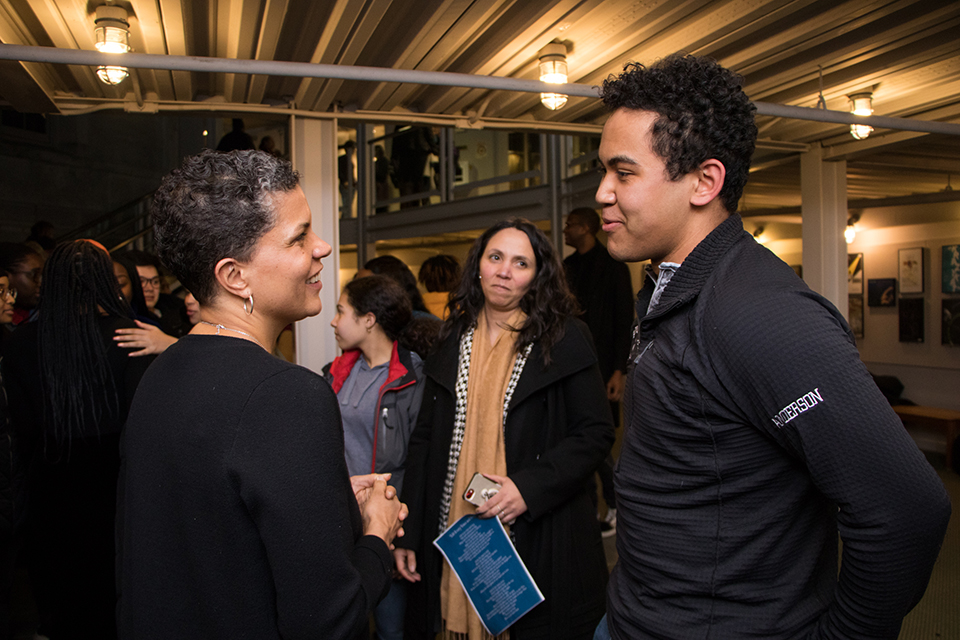Civil rights advocate Michelle Alexander calls for a ‘revolution of values’
January 24, 2020
 Ann Basu
Ann BasuIt didn’t take long for the audience in a packed Pickard Theater to give Michelle Alexander a standing ovation.
As soon as she walked on stage, everyone stood up.
Alexander, a renowned legal scholar, New York Times columnist and author of the best-selling book “The New Jim Crow,” visited Bowdoin on Thursday to participate in a moderated discussion, entitled “Mass Incarceration in the Age of Colorblindness,” this year’s annual Martin Luther King Jr. Commemorative Lecture.
First published in 2010 and re-released this year in a 10th-anniversary edition, “The New Jim Crow” has widely been credited with bringing mass incarceration and criminal justice reform to the forefront of the national political conversation. In her book, Alexander argued that the United States criminal justice system has come to replicate the racial caste system that had previously been upheld by Jim Crow regimes.
The discussion was moderated by two Bowdoin alumni: Tina Nadeau ’01, the executive director of the Maine Association of Criminal Lawyers, and Zach Heiden ’95, the legal director at the American Civil Liberties Union of Maine.
Flanked by Nadeau and Heiden, Alexander fielded questions about King’s legacy, the status of criminal justice reform in the Trump era and the wells of inspiration that she draws from when just about everything—not just the prison system—seems to be getting worse.
Invoking the spirit of King, Alexander spoke about the need not only to dismantle the political and economic systems that enable mass incarceration but also to reevaluate the moral imperatives that allow such a system to continue.
“As long as there is some of ‘us’ that we allow to be labeled as ‘them,’ we know now from history—we’ve got to have learned by now—that they will be treated as disposable,” said Alexander. “If we are going to embrace a true revolution of values, it’s got to begin there—that none of us, no matter who we are or where we came from or what we have done, can ever be treated as disposable.”
Alexander also reflected on the legacy of her seminal work, which she wrote during a time in an America that was very different, yet also very similar to the America of today.
“Everything and nothing has changed in the last 10 years,” Alexander said. “In the time I was writing the book, Barack Obama hadn’t even been elected president yet … and now we have President Donald Trump, who openly sympathizes with white nationalists.”
Despite these profound political changes, Alexander argued, the basic dynamics of racialized democracy have stayed the same.
“The basic politics of white supremacy have remained, operating in this nation throughout our nation’s history. It has remained a constant,” Alexander said. “It gave birth to a system of mass incarceration as well as a system of mass deportation during a time when many of us thought our nation was colorblind.”
Alexander also criticized the recent trend of so-called innocence politics, embodied by recent Hollywood films like “Just Mercy” and “When They See Us,” which hold up the stories of wrongly-convicted felons as proof of the brokenness of the criminal justice system. While Alexander noted that she is sympathetic to this approach, she argued that a complete reevaluation of the criminal justice system must take into account the humanity even of convicted criminals.
“We will never stop the rebirth of systems of racial and social control in this country as long as we turn a blind eye once someone is labeled a criminal,” Alexander said. “The system of mass incarceration and the system of mass deportation depends on us no longer caring about those who have been labeled ‘criminals’ or ‘illegal.’”
Alexander answered two questions for the audience before the question-and-answer session was cut short by time constraints. In her responses, Alexander urged students not to succumb to the illusion of powerlessness and to engage in the actual work of activism and reform.
“If we stay at a distance and intellectualize people’s suffering, we will have a very limited moral imagination. But when we can show up in solidarity and say I will show up for you and work with you … our moral imagination expands immediately,” said Alexander.
Immediately, once again, the audience stood up.
Comments
Before submitting a comment, please review our comment policy. Some key points from the policy:
- No hate speech, profanity, disrespectful or threatening comments.
- No personal attacks on reporters.
- Comments must be under 200 words.
- You are strongly encouraged to use a real name or identifier ("Class of '92").
- Any comments made with an email address that does not belong to you will get removed.

Unfortunately Bowdoin turned away literally dozens of folks from the Michelle Alexander speech on Thursday, including a great many students and people from the community. And it made no arrangements to either stream the event live or video record it for later broadcast. Too bad a school with $1.7 billion in assets can’t find a hand held video camera or figure out how to stream an important speaker the way it streams its basketball games. It could hardly have been a surprise that she would draw such a large audience.